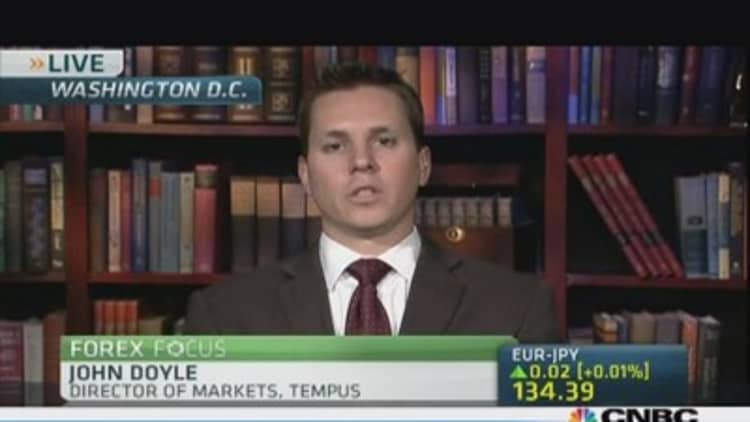
The resilient may have bounced back from this month's interest rate cut from the European Central Bank (ECB), but recovering from talk that the ECB is mulling negative deposit rates could be much harder, analysts say.
A report on Wednesday from Bloomberg News cited two unnamed sources as saying the central bank was considering lowering the deposit rate for cash it holds overnight for banks to below zero.
(Read more: The euro could disappear in 10 years: BlackRock CEO)
That knocked the euro down about 0.7 percent against the dollar, its steepest loss so far this month. And the single currency was still nursing its losses on Thursday as it hovered at $1.3426 in Asia trade.
"The euro really took a dip on reports that the ECB was considering negative rates for commercial lenders," John Doyle, director of markets at Tempus, told CNBC Asia's "Squawk Box."
"This is something we don't think the ECB realistically has on the table at the moment, but in this headline-driven market that we're in these days, the headline was enough to trigger a 0.7 percent fall in the euro," he added.
A cut in deposit rates would probably put off banks from parking their cash with the ECB, but could encourage them to lend instead, analysts said.
The ECB cut its main interest rate by 25 basis points to 0.25 percent earlier this month and while the surprise decision initially knocked the euro, the currency recovered from that blow pretty quickly.
(Read more: ECB was 'very pragmatic' to cut rates: UBS CEO)
Even after its overnight losses the euro is more than five percent above where it traded in July at around $1.27, although it is almost 3 percent off a two-year peak hit a month ago.
Not so tough?
Analysts said that even if the ECB left its monetary policy steady in the months ahead, the outlook for euro was not great.
"Some cracks in the euro's surface have already been appearing in recent weeks: 1) flow signals from the euro zone balance of payments have been less positive than we expected, 2) the price performance of euro zone stock markets is no longer leading, 3) euro zone growth expectations are no longer grinding higher," Jens Nordvig, managing director and global head of FX strategy at Nomura, said in a note.
The euro zone moved out of recession in the second quarter, with economic growth rising 0.3 percent from the first quarter of the year. Still, analysts say the economic growth outlook remains tepid.
The European Commission expects the euro zone's gross domestic product (GDP) to shrink by 0.4 percent this year. Earlier this month it revised down its forecasts for GDP growth next year to 1.1 percent from an earlier forecast of 1.2 percent growth.
Euro zone unemployment will remain near its record high for the next two years amid subdued economic growth, the European Commission said.
(Read more: EU Commission cuts euro zone growth forecasts for 2014)
"All told, the euro's bull-run since April may be running out of steam," said Nomura's Nordvig.
Kathy Lien, managing director at BK Asset Management, agreed that the euro was poised for weakness even if the talk of negative interest rates did not materialize into action from the central bank.
"U.S. rates are headed higher and it should therefore only be a matter of time before the dollar gains upside momentum versus the euro," she said in a note.
—By CNBC.Com's Dhara Ranasinghe; Follow her on Twitter @DharaCNBC


